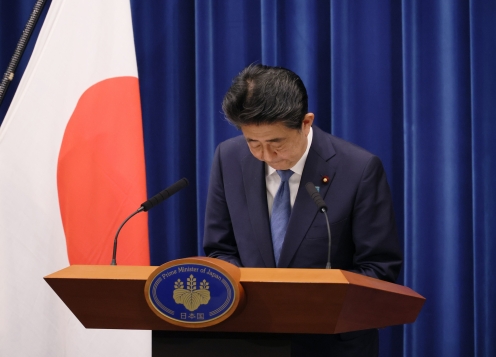Japan’s Prime Minister Resigns
Luisa Chainferber
Senior Correspondent
Shinzo Abe, Japan’s longest serving prime minister, has resigned due to health reasons, reports CNN. For the past eight years, Mr. Abe has struggled with colitis, a non-curable inflammatory bowel disease. During a press conference on August 28, he apologized to the Japanese people as he stepped down from his role one year before the end of his term.
As a justification for his resignation, Mr. Abe stated that he started a new treatment for the disease, reports BBC. Since the treatment would take way his time from important decisions, he believed it was best to leave office. When asked, Mr. Abe did not respond to questions about who should replace him as prime minister. A parliamentary vote will take place to determine the new prime minister.
During his time in the office, some of Mr. Abe’s greatest accomplishments included building up Japan’s defenses and increasing military spending, although he was not able to modify the constitution’s pacifist Article 9.
Asian financial markets, including Japan’s benchmark Nikkei index, responded negatively to the resignation, reports CNN. This happened because since his first term in 2007, Mr. Abe has been an important force in Japanese politics and contributed significantly to the success of his political party, the Liberal Democratic Party (LDP).
In fact, Mr. Abe left a significant legacy for his country. According to The Washington Post, Mr. Abe was responsible for an ambitious agenda in Japan, including economic reform with brave monetary and fiscal policy, known as “Abenomics.” Additionally, Mr. Abe was key defender of Japanese international leadership and the liberal international order.
For example, as the Wall Street Journal notes, while other countries were increasing trade barriers, Japan under Mr. Abe’s leadership defended several trade pacts, such as the Trans-Pacific Partnership and a free trade agreement with the European Union. Mr. Abe also lowered the barriers for foreign workers to legally work in Japan.
Unsurprisingly, the expectation is that whoever succeeds Mr. Abe will likely continue his legacy, reports Bloomberg. For example, given the impacts of the COVID-19 pandemic, other Asian economies will benefit significantly if Japan continues to encourage its corporations to invest abroad. As many Asian economies worry about the implicit conditions of Chinese investment, Japanese financing could be a key alternative.
Although Japan’s Liberal Democratic Party has yet to vote on who will be Mr. Abe’s replacement, the expectation is that Yoshihide Suga will win the party’s leadership race on September 14, says Reuters. Suga was part of Mr. Abe’s chief cabinet secretary and will most likely become the new prime minister.
Regardless of who will be successor, Japan’s next prime minister will face significant challenges moving forward, reports The New York Times. Although Japan has had only a small number of coronavirus cases compared to other countries, the Japanese public was not pleased with the way in which Abe’s administration dealt with the pandemic. Additionally, the new prime minister must be prepared to manage the complexities of Japan’s relationships with the world’s two biggest economies: the United States and China.
Photo courtesy of Prime Minister of Japan Official (Wikimedia Commons)



